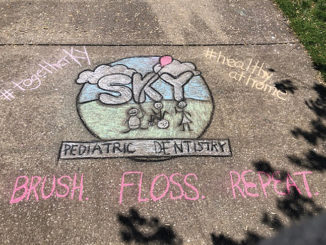
January is a great time to make a change for the better! And when it comes to preventing decay in your child’s teeth, the sooner you start implementing an oral health program, the better!
When I was growing up, we were told cavities were caused by not brushing. It seemed simple – just brush and prevent decay! In the past 30 years, a lot of dental research has focused on other factors that influence tooth decay rates. Many kids brush their teeth, but still have a ton of cavities. Dental researchers realized there must be something else going on. The newer research supports the idea that cavities happen when you have three things: a susceptible host, bacteria and food for the bacteria. This is referred to as the etiology of caries, or the real reason why kids get cavities. Let’s look at the ways you can use these factors to your advantage and reduce your child’s risk for cavities this year.
Susceptible Host: The susceptible host basically means your child’s teeth. Genetics play a part in determining who is more susceptible to cavities. Our individual genetic code can lay a framework for the quality of our teeth, bones and skin. The structure of the dental enamel within your child’s teeth can be extremely hard and cavity-resistant, or weak and prone to cavities or somewhere in between. And this can even vary within a family. This is one of the reasons why one child can have “perfect teeth” and rarely brush and another child gets new cavities all the time. There is even an immunologic response to the bacteria in our mouths that varies from child to child. Just as some kids are more prone to illness, some children are more prone to cavities because their bodies cannot launch an immunologic response to the cavity-causing bacteria in their mouths. Although we cannot alter our genetic predisposition to cavities, we can all reduce the amount of plaque on our teeth by brushing, flossing and using antibacterial mouth-rinse twice daily. This reduces the amount of living space for bacteria by reducing the amount of plaque on the teeth.
Bacteria: Without any bacteria, we would not have tooth decay. There is a particular group of bacteria called mutans streptococci that causes most tooth decay. A baby can be infected by bacteria from his/her mother’s mouth. Mothers and caregivers can inadvertently pass cavity-causing bacteria to their children via sucking on a pacifier to “clean it,” sharing the same spoon as the baby and pre-tasting or pre-chewing food. If the mother has a lot of cavities, and has a high level of these cavity-causing bacteria in her mouth, her children are more likely to receive more cavity-causing bacteria from her. This puts her kids at a higher risk of decay. So one thing a mom can do to help prevent cavities in her kids is to keep herself cavity-free. Moms can also use an antibacterial mouthwash daily to reduce the bacterial-load or amount of cavity-causing bacteria in their mouths.
Food for the Bacteria: Bacteria, like the cavity-causing mutans streptococci, love sugary foods that are easily broken down. One of the hidden things that increases a child’s risk for cavities is the FREQUENCY of sugary snacks. If a child snacks often or uses a sippy cup with juice throughout the day, the teeth are exposed to sugar for a much longer duration than kids who have one snack and drink water. The juice and sugary snack feed the cavity-causing bacteria, which produce acid, lowering the pH of the mouth and making the teeth much more susceptible to cavities. You can lower your child’s risk by reducing the number of times they are exposed to sugar during the day and limit their total daily juice to just 4 to 6 oz. per day. This is the amount that is in a tiny juice box.
Start 2024 with a plan to prevent cavities for your children. Take action to brush, floss and use a mouth-rinse with your kids. Consider how you can reduce transmission of cavity-causing bacteria from your mouth to your child’s mouth. And snack smart – think about avoiding sugary snacks and limiting juice to 4 to 6 oz. a day. We can all take small steps towards a lifetime of healthy smiles for the children in our lives. Your child’s dentist can help you come up with a more focused cavity-prevention game plan based upon your child’s specific needs.
-by Dr. Mandy Ashley
About the Authors: Dr. Mandy Ashley and Dr. Madison Galloway are Board Certified Pediatric Dentists proud to serve the communities of Bowling Green, Hopkinsville and Glasgow! We look forward to sharing our vision of excellent comprehensive dental care that is fun for children and people with special healthcare needs with your family.
SKY Pediatric Dentistry has been providing dental care to children and adults with special needs since 2013. As board-certified specialists in dentistry for children, our team strives to make going to the dentist as fun as possible while maintaining high-quality treatment and preventative measures. We tailor treatment plans to each child and offer a wide range of treatment options, including sedation, in-office general anesthesia and also hospital-based dentistry. With over 25 YEARS of doctor experience, SKY Pediatric Dentistry is a great choice for children’s dental care in Bowling Green, Hopkinsville and Glasgow!




